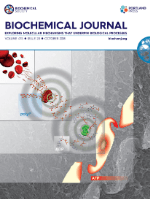
Nature Metabolism
Scope & Guideline
Exploring the intricate connections of metabolism and disease.
Introduction
Aims and Scopes
- Metabolic Regulation and Homeostasis:
Research focused on understanding how metabolic pathways are regulated and how this regulation affects overall homeostasis in organisms, including studies on insulin signaling, energy expenditure, and metabolic adaptation. - Microbiome and Metabolism:
Exploration of the interactions between gut microbiota and host metabolism, investigating how microbial metabolites influence metabolic health and diseases such as obesity and diabetes. - Cancer Metabolism:
Examination of the metabolic alterations in cancer cells, including the role of metabolic pathways in tumorigenesis, tumor progression, and responses to therapy. - Nutritional Metabolism:
Studies on how dietary components and interventions influence metabolic health, including research on the effects of specific diets, fasting, and nutrient timing on metabolism. - Cellular and Molecular Metabolism:
Investigations into the cellular mechanisms that regulate metabolic pathways, including studies on mitochondrial function, cellular senescence, and lipid metabolism. - Translational Metabolism Research:
Research aimed at translating basic metabolic science into clinical applications, including the development of innovative therapies for metabolic diseases.
Trending and Emerging
- Omics Technologies in Metabolism:
The application of multi-omics approaches, including genomics, proteomics, and metabolomics, is increasingly prominent, allowing for a comprehensive understanding of metabolic networks and their dysregulation in diseases. - Inter-organ Communication in Metabolism:
Research focusing on how different organs communicate metabolically, particularly in the context of diabetes and obesity, is gaining traction as studies explore systemic metabolic regulation. - Metabolic Role of Extracellular Vesicles:
Emerging studies are investigating the role of extracellular vesicles in metabolic signaling and intercellular communication, highlighting their potential as biomarkers and therapeutic targets. - Personalized Nutrition and Metabolism:
There is a growing emphasis on personalized nutrition strategies that consider individual genetic and metabolic profiles, aiming to optimize dietary interventions for metabolic health. - Metabolic Reprogramming in Immune Cells:
The intersection of metabolism and immunology is a rapidly growing field, with research exploring how metabolic pathways influence immune cell function and their implications for diseases like cancer and autoimmunity.
Declining or Waning
- Traditional Diet Studies:
Research focusing solely on traditional dietary impacts without considering the microbiome or genetic factors seems to be waning, as newer studies emphasize the role of gut microbiota in dietary responses. - Simple Metabolic Pathway Studies:
There has been a noticeable decline in studies that focus solely on single metabolic pathways without considering their interactions with other biological systems, reflecting a move towards more integrative approaches. - Animal Models in Isolation:
The reliance on animal models without integrating human studies or translational approaches is decreasing, as researchers emphasize the importance of human-relevant findings in metabolic research.
Similar Journals

AMERICAN JOURNAL OF PHYSIOLOGY-ENDOCRINOLOGY AND METABOLISM
Transforming understanding in endocrinology and metabolism.American Journal of Physiology-Endocrinology and Metabolism, published by the American Physiological Society, stands as a leading platform for disseminating high-quality research in the fields of endocrinology, diabetes, and metabolism, as well as general physiology. With an impressive impact factor placing it within the Q1 category across multiple relevant disciplines (Endocrinology, Diabetes and Metabolism; Physiology; and Medical Physiology), this journal reflects its authoritative position in the scientific community. Spanning from 1980 to 2024, the journal consistently publishes groundbreaking studies and significant findings that advance our understanding of hormonal regulation and metabolic processes. Although it does not currently offer open access, it provides valuable resources for researchers, professionals, and students alike, eager to stay at the forefront of advancements in physiological sciences. Addressed in Rockville, Maryland, its commitment to excellence and rigorous peer review ensures that every article contributes essential insights to the field.

JOURNAL OF PHYSIOLOGY AND BIOCHEMISTRY
Advancing the Frontiers of Physiology and BiochemistryJOURNAL OF PHYSIOLOGY AND BIOCHEMISTRY, published by Springer in the Netherlands, serves as a pivotal platform for disseminating high-quality research within the fields of physiology, biochemistry, and related biomedical sciences. With an impressive impact factor reflected in its categorization as Q2 in Biochemistry and Q1 in Medicine (miscellaneous), this journal fosters a vibrant community of scholars dedicated to advancing knowledge and innovation. The journal’s broad scope encompasses a wide range of topics from cellular mechanisms to systemic physiology, making it relevant for both theoretical and applied sciences. Researchers and practitioners are encouraged to utilize the available Open Access options to reach a wider audience. The journal’s continuous contribution to the scientific dialogue since its inception in 1996 positions it as a key resource for professionals and students alike, facilitating the exploration of cutting-edge topics and collaborative research opportunities.

JOURNAL OF CELLULAR PHYSIOLOGY
Fostering Excellence in Cellular Research and InnovationJOURNAL OF CELLULAR PHYSIOLOGY, published by Wiley, is a leading peer-reviewed journal that has been at the forefront of cellular research since its inception in 1945. With its prestigious Q1 and Q2 rankings in the fields of Clinical Biochemistry and Cell Biology, this journal is highly regarded within the scientific community, reflecting its significant impact factor and rigorous peer-review process. Addressing the intricacies of cell function and physiology, it serves as a crucial resource for researchers, professionals, and students dedicated to advancing knowledge in the life sciences. The journal publishes cutting-edge research articles, integral reviews, and significant findings that bridge basic biology and clinical applications, ensuring access to high-quality scholarly content that informs current practices and future research directions. Although not open access, the journal maintains a rich archive of studies, making it an essential reference point for those invested in the health and biological sciences.

Frontiers in Bioscience-Landmark
Pioneering Insights in Bioscience ResearchFrontiers in Bioscience-Landmark is a prestigious journal published by IMR PRESS that focuses on a diverse array of topics within the fields of biochemistry, genetics, molecular biology, immunology, and microbiology. With the ISSN 2768-6701 and E-ISSN 2768-6698, this journal has carved a significant niche since its inception in 1996, making its mark in contributions to the scientific community all the way through to 2024. Having achieved a respectable Q2 cohort rank in multiple categories, including biochemistry and immunology, it stands out for its impactful research, evidenced by its current Scopus rankings which highlight it as a vital resource for ongoing studies and advancements in the biosciences. Despite not being open access, the journal ensures that readers have access to high-quality research articles that are peer-reviewed and designed to foster academic discourse. The importance of Frontiers in Bioscience-Landmark lies in its commitment to disseminating innovative findings that can significantly enhance our understanding of biological sciences, making it an essential read for researchers, professionals, and students alike.

HORMONE AND METABOLIC RESEARCH
Exploring the Interplay of Hormones and MetabolismHORMONE AND METABOLIC RESEARCH, published by GEORG THIEME VERLAG KG, stands as a reputable platform in the fields of biochemistry, endocrinology, and metabolism since its establishment in 1969. This peer-reviewed journal provides critical insights and advancements in the intricate relationships between hormones and metabolic processes, catering to researchers, healthcare professionals, and students alike. With an impressive convergence of knowledge spanning over five decades, it maintains a commendable Q3 ranking in multiple categories, including Biochemistry, Clinical Biochemistry, and Endocrinology, highlighting its contribution to cutting-edge scientific discourse. Although not an open-access journal, it offers a plethora of access options for readers and institutions, ensuring that vital research reaches those who need it most. Located in Stuttgart, Germany, the journal is positioned at the forefront of influential research in hormone and metabolic studies, emphasizing its importance for ongoing investigations into health and disease.

Journal of Endocrinology and Metabolism
Illuminating the path to breakthroughs in endocrinology and metabolism.Journal of Endocrinology and Metabolism is a dynamic and essential publication in the field of endocrinology, diabetes, and metabolism, published by ELMER PRESS INC in Canada. With an ISSN of 1923-2861 and E-ISSN 1923-287X, this journal serves as a pivotal platform for sharing innovative research and advancements from 2018 through 2024. Although categorized in the fourth quartile (Q4) for 2023, its commitment to high-quality research is reflected in its ongoing efforts to foster scholarly dialogue and illuminate critical issues within its scope. Targeting primarily researchers, healthcare professionals, and students, the journal aims to disseminate crucial findings that advance our understanding of endocrine functions and metabolic processes. Given its Scopus ranking of #207 out of 244 within its category, the Journal of Endocrinology and Metabolism continues to contribute to the global discourse on these vital health topics.

BIOCHEMICAL JOURNAL
Navigating the Complexities of Life at the Molecular LevelBIOCHEMICAL JOURNAL, published by Portland Press Ltd, stands as a leading publication in the fields of Biochemistry, Cell Biology, and Molecular Biology, reflecting a commitment to advancing scientific knowledge since its inception in 1945. With a distinguished Q1 ranking across these categories and impressive Scopus rankings, the journal serves as an invaluable resource for researchers, professionals, and students alike, facilitating critical discoveries and innovative research practices. Although not currently offering open access, the journal provides a platform for high-quality peer-reviewed articles, ensuring rigorous standards in the dissemination of biochemical research. Spanning over seven decades and continuing through to 2024, the BIOCHEMICAL JOURNAL fosters an environment where cutting-edge biochemical research thrives, supporting the global scientific community's efforts to address complex biological questions and enhance our understanding of fundamental cellular processes.

TRENDS IN ENDOCRINOLOGY AND METABOLISM
Shaping the future of endocrinology and diabetes.TRENDS IN ENDOCRINOLOGY AND METABOLISM, published by CELL PRESS, stands as a pivotal resource in the fields of endocrinology, diabetes, and metabolism. With its ISSN 1043-2760 and E-ISSN 1879-3061, this esteemed journal has been a leading platform since its inception in 1989, currently projected to span until 2024. Recognized within the top quartile (Q1) of its category, it boasts impressive Scopus rankings, holding the 4th position in Endocrinology and 8th in Endocrinology, Diabetes, and Metabolism. These rankings underscore its significant impact, evidenced by an impressive percentile rank of 97th and 96th respectively. The journal is committed to facilitating the dissemination of cutting-edge research and innovative insights, making it an essential read for researchers, clinicians, and students seeking to stay informed on the latest advancements in these critical fields. With a robust focus on providing thorough reviews and original research articles, TRENDS IN ENDOCRINOLOGY AND METABOLISM continues to shape the understanding and treatment of metabolic disorders.

Metabolites
Unlocking the secrets of biochemistry and health.Metabolites is a dynamic open-access journal published by MDPI that has been at the forefront of biochemistry, endocrinology, diabetes, and metabolism research since its inception in 2011. Based in Switzerland, this journal plays a crucial role in disseminating high-quality research, evident from its esteemed Q2 quartile rankings in biochemistry, endocrinology, and molecular biology categories for 2023. With an E-ISSN of 2218-1989, it provides essential insights into the metabolic processes underlying health and disease, thereby appealing to a diverse audience of researchers, professionals, and students dedicated to advancing knowledge in these critical fields. With its commitment to open access, Metabolites ensures that cutting-edge findings are readily available to the global scientific community, encouraging collaboration and innovation.

BIOCHIMICA ET BIOPHYSICA ACTA-BIOENERGETICS
Unveiling Molecular Mechanisms of Energy MetabolismBIOCHIMICA ET BIOPHYSICA ACTA-BIOENERGETICS is a prestigious journal published by Elsevier, dedicated to advancing the fields of biochemistry, biophysics, and cell biology. Established in 1967, this journal is committed to disseminating high-quality research that unveils the molecular mechanisms of bioenergetics, encompassing a wide range of topics from mitochondrial function to energy metabolism. With an exceptional impact factor and a current ranking in the Q1 quartile across multiple categories—specifically ranked #13 in Biophysics and featuring strong positions in Biochemistry and Cell Biology—this journal is recognized for its influential contributions to the scientific community. Scholars, researchers, and students globally benefit from its rigorous peer-review process and access options, although it is not currently open access. By providing a platform for innovative research, BIOCHIMICA ET BIOPHYSICA ACTA-BIOENERGETICS plays a critical role in fostering scientific advancement and collaboration among professionals in the field.